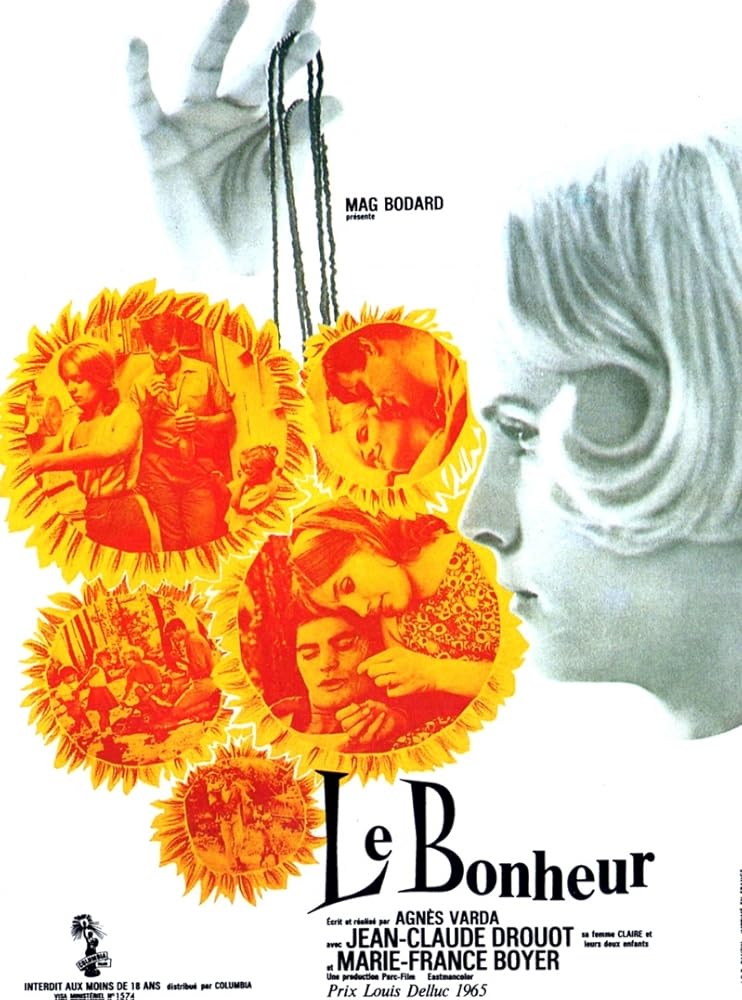
LE BONHEUR (HAPPINESS)
(director/writer: Agnès Varda; cinematographers: Jean Rabier/Claude Beausoleil; editor: Janine Verneau; cast: Jean-Claude Drouot (Francois), Sandrine Drouot (Gisou), Claire Drouot (Therese), Olivier Drouot (Pierrot), Marie-France Boyer (Emilie); Runtime: 79; Janus Films; 1965-France, in French with English subtitles)
“For Varda, chance is more of a reason people get married than love is.”
Reviewed by Dennis Schwartz
Agnes Varda’s first color film is shot in very warm and pleasing pastel hues, capturing the beautiful French countryside and the ordinary dwellings where the family featured resides. The Mozart playing in the background instills a dream-like magic into the lush natural settings. This film won the Special Jury Prize at the Berlin Film Festival in 1965.
What makes this film somewhat unique, is that Jean-Claude Drouot’s real wife and kids portray his movie spouse and offspring.
If the story is controversial, deemed by the reaction the film received when it opened, it can only be because a woman directed something that men have just assumed is in their exclusive province to do — that is make a film about a married man who takes a mistress.
The film opens with the happy family of Francois and his lovely redheaded wife Therese, and their two little children, the cute little girl Gisou and the older brother Pierrot, all having a wonderful weekend in the country. Marital bliss cannot be more idyllic than as shown on this picnic.
When the family returns home to their small-town of Fortenay, their uncle and aunt warmly greet them. We soon learn that Francois is a carpenter, working in his uncle’s place and that his wife stays home and does odd jobs as a dressmaker.
Francois is asked to go to Vincennes and check on a building site and while there he meets an attractive blonde postal clerk, Emilie, who is about to transfer to his hometown. As soon as she moves, she has him use his woodworking skills to put in some shelves and they waste no time falling passionately in love. This affair goes on secretly for a month, but is eating away at Francois because he makes a big deal about never lying. He told his mistress that he loves his wife and he rationalizes his love for her by saying: “I love you both and if I met you first, you would be my wife.”
Warning: spoiler to follow in next two paragraphs. If you don’t want to know the main event in the story, go on to the last paragraph.
On another of his idyllic family picnics he tries to explain to his wife how much he loves her and also loves his mistress. But he loves her first, and if she doesn’t want him to have a mistress he won’t. But his wife senses that he wants both of them and gives her quiet assent. After they make love in the woods, he takes a contented nap and when he is awakened he discovers his wife missing and that she drowned in the fishing pond.
Francois’s mistress will soon seamlessly take his wife’s place and the idyllic family picnics continue, as if nothing has happened.
This is a very sensual and visually satisfying film, one that shows how each of the characters is stuck in their own romantic dream-world. It might not have a very absorbing tale to tell, but it packs a more deep-seated emotional charge than what might appear at first glance. For Varda, chance is more of a reason people get married than love.
REVIEWED ON 12/3/2000 GRADE: A-